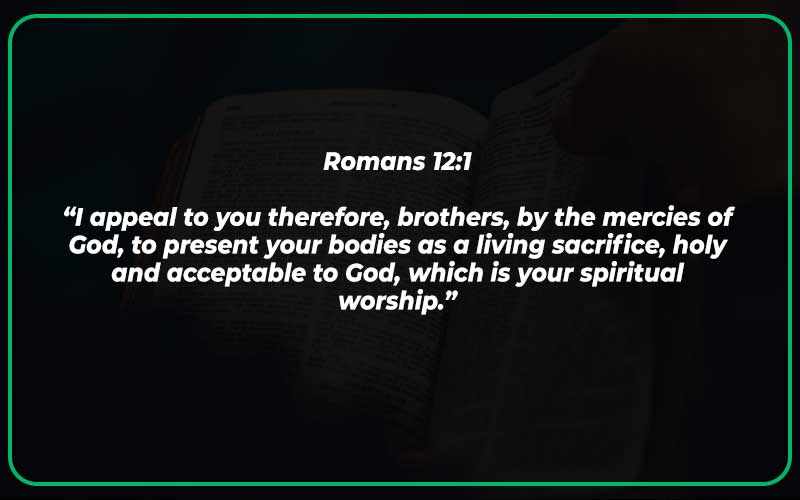As Christians, Lent is a significant season of reflection, repentance, and preparation for Easter. It’s a time when we seek to draw closer to God and renew our faith. In this blog post, we will delve into the Bible and explore powerful verses about Lent.
These verses remind us of the importance of self-examination, sacrifice, and spiritual growth during this solemn period. Join us as we uncover the profound wisdom and guidance that the Scriptures offer us during the season of Lent.
Also Read: Bible Verses About Meditation
Bible Verses About Lent
Matthew 4:1-2
Then Jesus was led up by the Spirit into the wilderness to be tempted by the devil. And after fasting forty days and forty nights, he was hungry.
Here, we see Jesus undergoing a period of fasting for 40 days and 40 nights in order to prepare himself for his public ministry. This is a reminder for us during Lent that a period of fasting can help us grow our relationship with God and prepare us for whatever he has in store for us.
Matthew 6:16-18
“And when you fast, do not look gloomy like the hypocrites, for they disfigure their faces that their fasting may be seen by others. Truly, I say to you, they have received their reward. But when you fast, anoint your head and wash your face, that your fasting may not be seen by others but by your Father who is in secret. And your Father who sees in secret will reward you.”
Jesus teaches us here on how to fast. It should be done without seeking attention or recognition from others, but rather to grow closer to God. Our acts of self-discipline should be done with a sincere heart as we turn from our selfish desires and towards God’s will.
Isaiah 58:6-7
“Is not this the fast that I choose:
to loose the bonds of wickedness,
to undo the straps of the yoke,
to let the oppressed go free,
and to break every yoke?
Is it not to share your bread with the hungry
and bring the homeless poor into your house;
when you see the naked, to cover him,
and not to hide yourself from your own flesh?”
This passage reminds us that fasting is not solely about ourselves and our own spiritual growth. It is also about serving others and breaking bonds of oppression, lending our aid to the less fortunate and working for justice in our communities.
Joel 2:12-13
“Yet even now,” declares the LORD,
“return to me with all your heart,
with fasting, with weeping, and with mourning;
and rend your hearts and not your garments.”
Return to the LORD your God,
for he is gracious and merciful,
slow to anger, and abounding in steadfast love;
and he relents over disaster.”
This passage teaches that fasting during Lent should be an act of humility and repentance, acknowledging that we have strayed from God’s path and seeking His forgiveness. We should come to God with contrite hearts and ask for his loving mercy and grace.
Romans 12:1
“I appeal to you therefore, brothers, by the mercies of God, to present your bodies as a living sacrifice, holy and acceptable to God, which is your spiritual worship.”
Paul reminds us that fasting is a form of worship that involves giving up our own desires and submitting our bodies, minds and souls to God. It is a way to grow closer to Him and offer all that we are to Him as an act of devotion.

John 3: 16-17
“For God so loved the world, that he gave his only Son, that whoever believes in him should not perish but have eternal life. For God did not send his Son into the world to condemn the world, but in order that the world might be saved through him.”
Lent is a time to reflect on God’s great love for us and the sacrifice he made through sending his son, Jesus Christ, to die for our sins. It is a reminder that God wants us to be reconciled with him and that through Christ, we have been given the gift of salvation and eternal life.
Mark 8:34
“And calling the crowd to him with his disciples, he said to them, “If anyone would come after me, let him deny himself and take up his cross and follow me.”
Christ calls us to lay down our lives and follow him, which involves denying ourselves and submitting to his will. Lent is a time to focus on what it means to carry our own crosses and follow Christ, even when it means putting our own desires and interests aside.
2 Corinthians 5:17
“Therefore, if anyone is in Christ, he is a new creation. The old has passed away; behold, the new has come.”
Lent is a time to reflect on the new life we have been given through Christ’s death and resurrection. With Christ living within us, we have the ability to overcome our sinful nature and become a new creation in Him.
Psalm 51:10
“Create in me a clean heart, O God, and renew a right spirit within me.”
During Lent, we can pray for God to purify our hearts and renew our mind, body and soul. It is a time to refocus our attention on what really matters and to ask for God’s guidance in our lives.
Philippians 3:10-11
“that I may know him and the power of his resurrection, and may share his sufferings, becoming like him in his death, that by any means possible I may attain the resurrection from the dead.”
Paul calls us to know Christ and be willing to suffer as he suffered, as we look towards the resurrection from the dead. This means that we must be willing to take up our own crosses, deny ourselves, and follow Christ during Lent.
James 1:12
“Blessed is the man who remains steadfast under trial, for when he has stood the test he will receive the crown of life, which God has promised to those who love him.”
Lent is a time of testing and trials, but it is also an opportunity for us to grow and be rewarded by God for our perseverance. As we face challenges and temptations, we must remember that God is with us and will see us through.
Colossians 3:23-24
“Whatever you do, work heartily, as for the Lord and not for men, knowing that from the Lord you will receive the inheritance as your reward. You are serving the Lord Christ.”
Lent is a time to recommit ourselves to serving God wholeheartedly in all that we do. We must remember that whatever we do, we do it for the Lord and will ultimately be rewarded by Him.
Luke 18:9-14
“He also told this parable to some who trusted in themselves that they were righteous, and treated others with contempt: “Two men went up into the temple to pray, one a Pharisee and the other a tax collector. The Pharisee, standing by himself, prayed thus: ‘God, I thank you that I am not like other men, extortioners, unjust, adulterers, or even like this tax collector. I fast twice a week; I give tithes of all that I get.’ But the tax collector, standing far off, would not even lift up his eyes to heaven, but beat his breast, saying, ‘God, be merciful to me, a sinner!’…”
This passage reminds us that Lent is not about outward show, but rather a time for self-examination and seeking God’s mercy and grace. We should approach God with humility and openness, acknowledging our own sinfulness and asking for His forgiveness.
Psalm 32:5
“I acknowledged my sin to you,
and I did not cover my iniquity;
I said, “I will confess my transgressions to the LORD,”
and you forgave the iniquity of my sin.”
Lent is a time for confession and seeking God’s forgiveness. We must acknowledge our own shortcomings and repent, turning towards God with gratitude for his mercy and love.
1 Corinthians 9:27
“But I discipline my body and keep it under control, lest after preaching to others I myself should be disqualified.”
During Lent, we should seek to discipline ourselves and keep ourselves accountable, in order to be prepared to serve God and others. This can involve denying ourselves certain pleasures or putting in extra effort to grow in our faith and ministry.

What is a good Bible verse for Lent?
One of the most relevant and meaningful Bible verses for Lent is found in Psalm 51:10:
“Create in me a clean heart, O God, and renew a right spirit within me.”
This verse encapsulates the essence of the Lenten season, which is a period of reflection, repentance, and spiritual renewal. Lent is a time for believers to examine their hearts, acknowledge their shortcomings, and seek God’s forgiveness. The call to have a clean heart and a renewed spirit emphasizes the transformative nature of Lent, where individuals aspire to draw closer to God and become more aligned with His will.
What Scripture is the 40 days of Lent?
The 40 days of Lent correspond to the period of Jesus’ fasting and temptation in the wilderness, as described in the Gospel of Matthew 4:1-11:
“Then Jesus was led up by the Spirit into the wilderness to be tempted by the devil. He fasted forty days and forty nights, and afterwards, he was famished. The tempter came and said to him, ‘If you are the Son of God, command these stones to become loaves of bread.’ But he answered, ‘It is written, One does not live by bread alone, but by every word that comes from the mouth of God.'”
This passage narrates Jesus’ profound spiritual journey during the 40 days of Lent. His self-denial and resistance to temptation serve as an example for Christians, encouraging them to persevere through their own struggles and trials. It reminds believers of the significance of relying on the Word of God for sustenance, rather than solely seeking physical comforts.
What is an inspiring quote about Lent?
One inspiring quote that encapsulates the spirit of Lent comes from Pope Francis:
“Lent is a time of grace, a time to convert and live out our baptism fully.”
In this quote, Pope Francis highlights the opportunities presented by the Lenten season. Lent is not merely a time of fasting and abstinence but a season of grace, inviting believers to turn away from sin, embrace a life of conversion, and embrace the calling of their baptism – a symbolic representation of cleansing and rebirth in Christ. It is a reminder that Lent is not only about giving up certain indulgences but about deepening one’s relationship with God and living a more authentic Christian life.
Which book in the Bible to read for Lent?
During Lent, one of the most fitting books in the Bible to read is the Book of Isaiah. This Old Testament book contains rich prophetic messages and themes that align with the Lenten season.
The Book of Isaiah can be divided into two main parts. The first section (chapters 1-39) comprises messages of judgment and warnings for the people of Israel due to their disobedience and unfaithfulness. This part of Isaiah resonates with the theme of repentance during Lent, as it calls people to acknowledge their sins, turn back to God, and seek forgiveness.
The second section (chapters 40-66) offers messages of hope, comfort, and restoration. These chapters contain numerous prophecies about the coming Messiah and the promise of redemption through Him. For Christians, reading these passages during Lent can foster a deeper appreciation of Jesus’ sacrifice on the cross and the hope of salvation that He brings.
Moreover, the Suffering Servant Songs in Isaiah (found in chapters 42, 49, 50, and 53) provide profound insights into the suffering and sacrificial nature of Jesus Christ. These passages foreshadow Jesus’ crucifixion and highlight His role as the ultimate redeemer, making Isaiah especially pertinent for Lenten contemplation.
By reading the Book of Isaiah during Lent, believers can immerse themselves in the messages of repentance, redemption, and hope, ultimately drawing closer to God and gaining a more profound understanding of the significance of Jesus’ sacrifice.
Conclusion
Lent is a significant and spiritually meaningful season for Christians worldwide. It is a time of reflection, repentance, and preparation for the celebration of Easter. As believers embark on this 40-day journey, they seek to draw nearer to God, acknowledge their sins, and focus on Jesus’ sacrifice and resurrection.
In light of this, Psalm 51:10 serves as an essential guiding verse, reminding individuals to seek a clean heart and a renewed spirit during Lent. The 40 days of Lent align with Jesus’ fasting and temptation in the wilderness, as recounted in Matthew 4:1-11, symbolizing the period of spiritual testing and preparation.
Pope Francis’ quote emphasizes the grace and conversion that Lent offers, urging Christians to fully live out their baptismal calling. And for those seeking a book in the Bible to read during Lent, the Book of Isaiah stands out as a powerful choice. Its messages of judgment, repentance, hope, and the Suffering Servant Songs provide ample opportunities for introspection and spiritual growth.
May the Lenten season be a time of deep spiritual reflection and transformation, as believers seek to follow Christ more closely and embrace the profound grace and love of God. As Psalm 51:10 suggests, may God create in us clean hearts and renew right spirits within us, so that we may journey through Lent with sincere devotion and emerge spiritually strengthened and rejuvenated for the glorious celebration of Easter.

